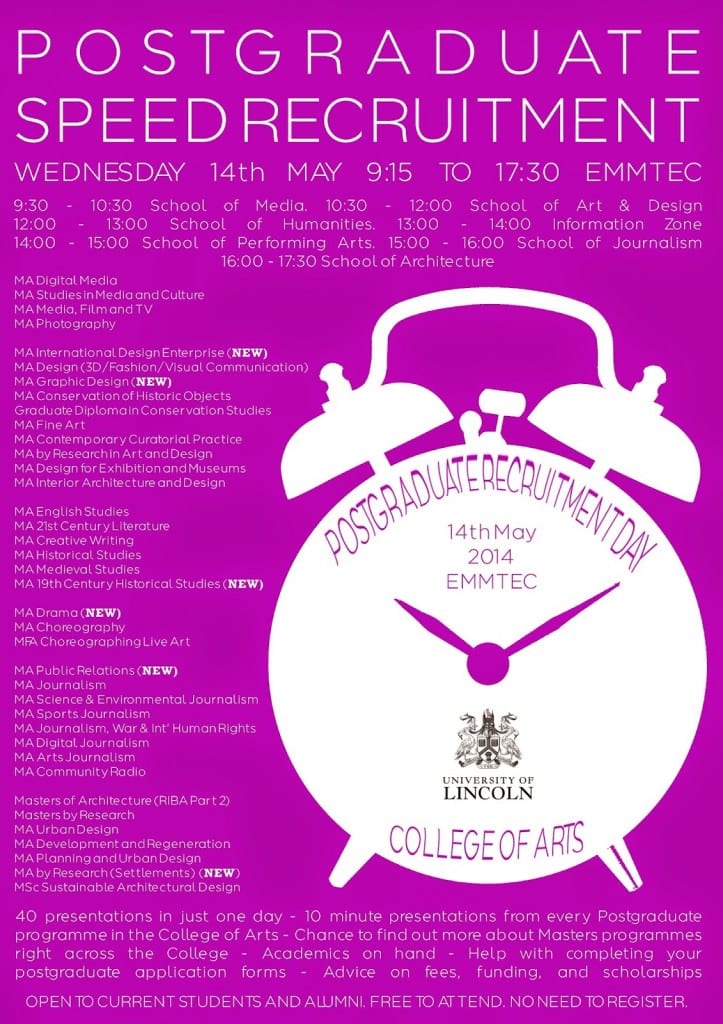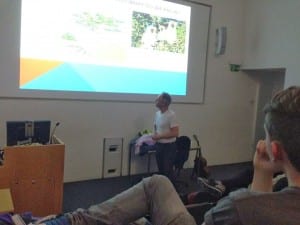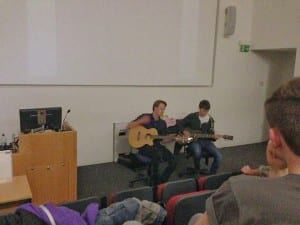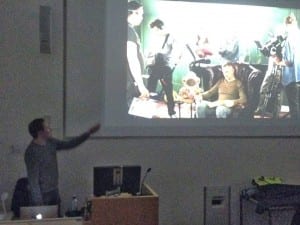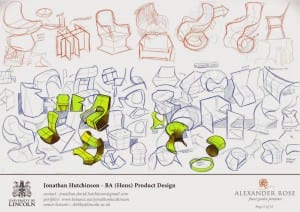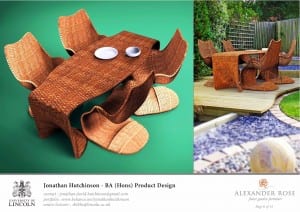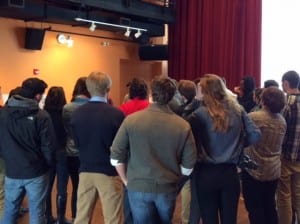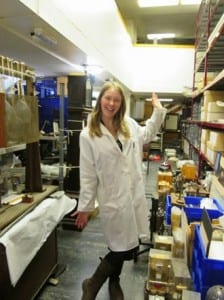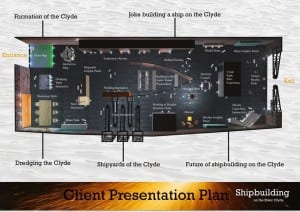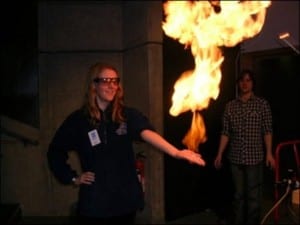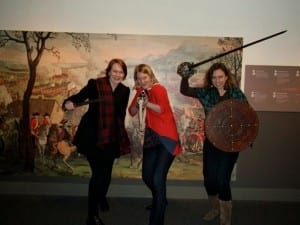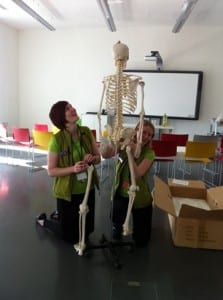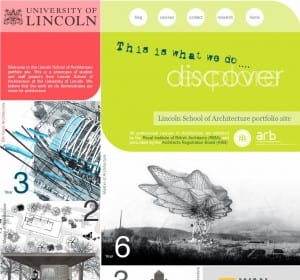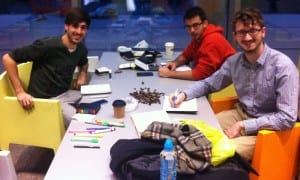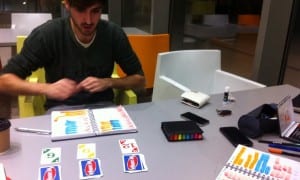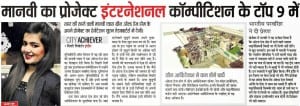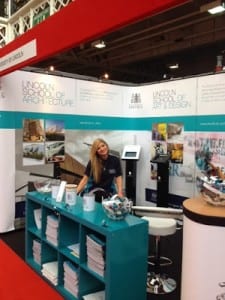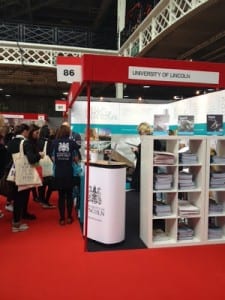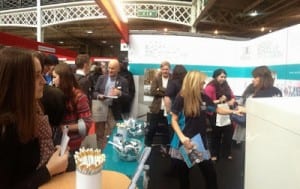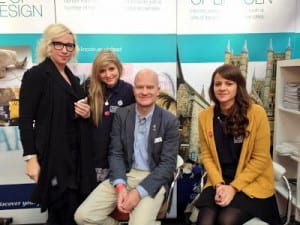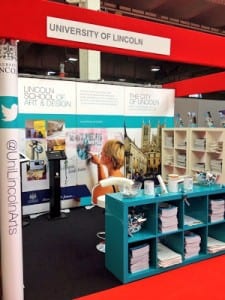Thinking about life after university? How about, you know, staying for a bit longer? A postgraduate degree is a fantastic way to enhance your career opportunities and can really help you forge a niche for yourself. We’re certain that you’ll get the job of your dreams if you work hard enough for it anyway, but coming along to our postgraduate recruitment day can only help.
Enterprise Inc open for applications
Have you ever watched an episode of Dragons’ Den and thought to yourself, “Hey, I’ve got a better idea than that,”? Well it’s time to get up off your sofa and do something about it, future Richard Bransons.
The applications for the Enterprise Inc scheme are now open, and while the panel might not be as terrifying as the one on television, they are just as good at helping to get your business idea off the ground. Over the past couple of years the scheme has helped countless creative students get the business support they need to start their journey into the sometimes mystical land of being self-employed. Illustrators, jewellery designers, conservators, film directions, photographers and many more have all passed through the Enterprise doors and are now earning a living doing the thing they love. Next year when we write a similar blog post about this, one of those people could be you!
Not only does the scheme offer a series of fantastic workshops delivered by leading professionals (we did one once. Only one person left early) but it also provides the lucky few who get on with the opportunity to receive £2500 of funding to help their businesses get started.
This is a terrific opportunity for anyone who feels they have a bit of entrepreneurial flair or an idea that can’t be ignored. If that sounds like you then email rclayforth@lincoln.ac.uk or pop into the Enterprise building to find out more.
Remember us when you’re super successful. We’d like our own island.
Fred Talks
Fancy reading about an exciting new series of talks set up by some of our own exciting students? Good. Here’s Creative Advertising 3rd year Emma Thomas to tell you more.
Everybody loves tradition so we thought it was about time the Creative Advertising Society started one of their own. The Fred talks. A delightful mixture of live talks, live music and weird and wonderful TED talks for a little bit of creative ignition. An event that all members of the society could enjoy and benefit from.
Held in a lecture theatre in the Art, Architecture and Design building, our first Fred talks gave a wide variety of topics. Starting with Dr Emile van der Zee, Principal Lecturer at the School of Psychology here at Lincoln, talking about dog psychology. How are dogs able to recognise words and phrases? He spoke about his own research into the topic, showed some incredibly intelligent dogs and left us all amazed by the findings from his research. Days later and the attendees are still talking about those dogs.
Next up was a short and probably unintentionally humorous TED talk informing us on the correct way to dry you hands. Shake and fold everybody, shake and fold..
Our next act was brought to us the in form of our very own talented Creative Advertising students, Jack Snell and Joe Lovett. The duo performed their renditions of Awolnation’s Sail, Stereophonics Dakota and Chuck Berry’s Johnny B Good. All three crowd pleasers.
A change of pace came from our next TED talk Neil Harbisson ‘I listen to color’. An incredible story of a colour blind male who, with the help from a device on this head, was able to listen to the colours around him and turn his grey scale world into colour.
Ending the evenings Fred talks was Creative Advertising’s own Justin Tagg. Justin has recently finished filming a short film ‘Mouse-X’ and told the incredible journey of the film from script to screen and showcasing his hard work and determination. Covering crowd funding, set production and even his time at the Cannes film festival earlier on in the year, he left us all with the lasting sentiment of don’t just dream, do. We’re now nearing the time of the year to pass the society over to a new committee and wait with anticipation to see next year’s Fred talks line up.
The Daily Doodle
Every day is an opportunity to show off your talents, but sometimes it can be hard to find out where to do it. Fortunately for illustrators a window has opened to help them do just that.
Mark Chambers, illustrator and University of Lincoln alumni, has set up the Daily Doodle, a Twitter account with the intention to get people drawing. The account will post a different topic every day and ask people to submit their responses so it can show them off to the wider public, including a number of top publishers and nationally known illustrators.
It’s always great to see opportunities like this spring up, so we’d urge you all to get following on Twitter and have a go!
Product Design student highly commended
Product Design level 2 student Jonathan Hutchinson has been “Highly Commended” in the recent Alexander RoseOutdoor Furniture Design competition.
To celebrate his success, Jonathan has been invited down to the company’s headquarters to talk about his ideas and the possibility of them being put into production as part of the Alexander Rose range.
Invisible Cities
Saturday 15th March saw forty applicants for BA (Hons) Architecture taking part in an intensive studio session. They worked with twelve student tutors from second third and fifth years to create fantastic models based on Italo Calvino’s Invisible Cities. The book is a conversation between Marco Polo and Kublai Khan describing the cities the explorer has visited in his travels around the Khan’s empire.
Each group of four applicants was given a fragment of text and, working very quickly, produced 2D representations of the city they imagined. With their student tutor, the group decided on the most promising aspects to bring together to make their 3D representation. They could choose to model the whole city at Lilliputian scale or to model a representative fragment of the city at close to full scale.
The three-hour project engaged us in multi-disciplinary teamwork of the kind that we can expect all designers to experience in contemporary practice. The project also tested ingenuity in spotting the potential in materials and adapting proposals to accommodate evolving ideas generated by the group.
This project demonstrated that a great deal can be achieved in a short time by imaginative people exploring architecture in a creative environment. The buzz and the energy generated and the beautiful work produced made this a great experience for everyone involved. We can’t wait to start work for real with this group of applicants as the core of our first year in September 2014.
MAIDE went to Philadelphia
Some of our MA International Design Enterprise (MAIDE) students visited their design counterparts at Philadelphia University to present their ideas to the design director of Canadian company UMBRA. Umbra, meaning ‘shade’ in Latin, are a world leader in modern, original, casual and affordable design for the home and are therefore a terrific company for developing designers to get involved with.
The MAIDE students worked with their Philadelphia colleagues to develop a range of ideas ready for pitching. After all the presentations, a total of four were taken back to the UMBRA design team for their consideration.
Relationships like this, with other universities and leading design firms, are great for our students and are a good footing for further similar opportunities to arise in the future.
Sustainable, vernacular and natural architecture talk.
Hey, you, would you like to learn more about sustainable, vernacular and natural architecture? If the answer is yes then you’re in luck, as next Wednesday (the 26th February) you can meet the East Midland Earth Stucture Society (EMESS) to discuss ‘radical eco-architecture’.
Sound good? Hop on over to the MB1009 in the MAB at 7pm to get involved. ArchLOVE will be there to present on those issues along with members of the Abundant Earth Community so this will be a great opportunity to discover more about alternative architectural practices from some people who work with them every day.
DEM graduate now curator in Aberdeen
We like a good success story at Lincoln. Not only do they make us feel warm and tingly on the inside, but they also mean that the people who graduate from here are going on to have good, prosperous lives, and that’s what we’re all about at the heart of it.
Today’s tale of good things comes from a graduate of the Design for Exhibition and Museums BA(Hons) course. Gillian Macnee graduated in 2006, when the degree was called Museum and Exhibition Design, and is now working as Curator of Learning and Access at the University Museums of Aberdeen. We got in touch and asked her for a few words on her experience of Lincoln. Here’s what she had to say:
“I thoroughly enjoyed my time at Lincoln. Geoff and Pam were amazing teachers; it sounds corny but some of the lessons they taught me I still apply to my work today! Firstly that every good exhibition should be about telling a story. You have to find and show that story in the best possible way, and I still always do that when planning exhibitions or workshops. Storytelling is what it all boils down to.
Secondly you have to eventually stop brainstorming new ideas and decide on one. It took me all of my degree to learn that! I kept changing my mind and changing ideas and designs, but at some point you have to stop!”
Gillian also sent us some photographs of her working life so far. We’re sure you’ll agree that her work looks a lot more fun than the average day!
New portfolio site unveiled
Students at the Lincoln School of Architecture start producing concept and model work from the minute they arrive, but up until now that work has only been seen by their peers, their tutors and anyone else they choose to show themselves.
All of that is about to change, with the launch of our brand new portfolio site. Designed to show off the best of the School’s creativity, the site will be updated to bring you all the latest gems coming out from across the year groups. Put together by our own Barbara Griffin, senior lecturer on the MArch course, we’re sure you’ll agree that it looks AMAZING and showcases the great range of what our students have to offer.
You can see the site here. Check back often to see everything what’s being produced.
MAIDE for the future
The University of Lincoln is set to play host to a network of industry leading designers, artists and educators as they contemplate the future of our creative industries.
The Jobs 2050 Design Learning Challenge will see some of the biggest names from the design work look ahead to what the future might hold (particularly by 2050, hence the title) and work together to anticipate what things could look like tomorrow for the next generation of creative minds.
Taking place over three days, from the 11th to the 13th February, the Challenge will task participants with contemplating an increasingly entrepreneurial society.
Doris Wells-Papanek, one of the founders of the Challenge and Director of the Design Learning Network in the USA, said, “By 2050, students who graduate from high school in 2015 will be over 50 and babies born today will be in their 30s. The university students and school pupils who engage in this challenge with our network of professional designers will therefore be addressing the learning needs of the next generation of creative problem solvers as well as their own.”
Over 500 participants, from both universities and secondary schools, are set to attend the workshop programme and will be offered a unique opportunity to work with their peers sitting over 5,000 miles away via real-time Skype conversations.
David Bramston, another of the Challenge’s founders and Programme Leader for MAIDE at the University of Lincoln, said, “International communication is central to our MAIDE course here at Lincoln. Our postgraduate students are already participating in projects with design partners around the world; in Beijing, Philadelphia, Toronto, Shanghai and Gaungzhou. The programme actively encourages students to engage with the international design community, creating new proposals for a wide range of clients, trade fairs and exhibitions. We are delighted to be bringing the creative sector together again with our second Design Learning Challenge. Here at Lincoln we share a vision with Doris; to create effective and sustainable links between designers and educational institutions on a global scale. We hope this project will encourage the community to embrace new forms of communication, to help solve design challenges of the future.”
Hugh Byrd flies into the news
We always like it when our students get success. It’s what we’re here for, really. But it’s also pretty fantastic when our academics are recognised too. So imagine the smile on our faces when we learnt that Professor Hugh Byrd, from the BA(Hons) Architecture course, had seen his work included in The Guardian.
Hugh was talking about how power outages of the past could be an indication of more major blackouts in the future. We could tell you more, but the people at The Guardian are pretty good at writing a story so we’ll leave it up to them. You can read the full article here.
Interactive Brainstorming
Current final year BA (Hons) Interactive Design students James Miller, Ferran Bertran and Issac Gil in the middle of a brainstorm session around the concept of Intolerance as part of their latest brief.
Basically they are dynamizing the brainstorm by using some creative techniques such as dissociation and some gameful activities designed to generate ideas.
More examples of their latest projects and ideas can be found on their individual websites (click on the above names).
Design Learning Network Tackles the Plight of the Honeybee
On Aug. 24, 2013, 80 leading designers, along with STEM (science, technology, engineering, math) and design educators from around the world, connected in real time through Skype for a first of its kind linked workshop. Pioneered by Doris Wells-Papanek, director of the Design Learning Network and David Bramston, principal lecturer at the University of Lincoln’s School of Art and Design, the five-hour event provided an innovative professional development platform for the international design education and STEM community to explore and share ideas about a honeybee’s life in the year 2050.
Hosted by The University of Lincoln and the Design Learning Network at Columbia College in Chicago, the Chicago-Lincoln Design Learning Challenge Workshop was co-facilitated by design practitioners from the Industrial Designers Society of America’s 2013 International Conference. The two groups, 40 at The University of Lincoln and 40 at the Columbia College, dug into a real-world problem using the design learning process.
In keeping with the Design Learning Network’s primary mission – the two international groups grappled with why honeybees are dying at an alarming rate world and how might we save them. Using an interdisciplinary approach (art, design, the humanities and STEM), the purpose of the challenge was to serve as an exemplar for educators around the world to invite their K-12 students to become creative problem solvers, take ownership of their learning and make good choices.
Mankind needs honeybees to survive. As reported by AP reporter Seth Borenstein in The Buffalo News on Sept. 1, 2013:
“Besides making honey, honeybees pollinate more than 90 flowering crops. Among them are a variety of fruits and vegetables: apples, nuts, avocados, soybeans, asparagus, broccoli, citrus fruit and cranberries. About one-third of the human diet comes from insect-pollinated plants, and the honeybee is responsible for 80 percent of that pollination.”
Using an eco-centered approach, the blended U.S. and U.K. teams explored contributing factors to the honeybee’s current trajectory – then designed a sustainable solution that encouraged population growth, restored and maintained nature-driven pollination practices, and enhanced the quality of life of locally based colonies.
One of the U.K. teams, which was composed of 1st Corby Glen Cub Scout pack, assistant pack leader Jacob Lamming, two 14 year olds, real estate owner Jo Davies and team leader and master’s in design student A.J. Woodward, believed that by planting more flowers it would help grow the bee population.
“We knew that flowers were crucial to bees and you can grow them anywhere. We came up with using an idea pinned on Pinterest of using old milk cartons to grow flowers,” said Woodward. We liked the idea of using the old milk cartons because it recycled the cartons and showed that you didn’t necessarily need a garden to grow the wild flowers.
As an unexpected bonus, the team was given a few acres by a local park to create a bee haven. “We decided as a group to not only have a field of wild flowers but to have a bee hive in there too,” said Woodward. Lincoln University offered to help them produce their beehive design from a salvaged washing machine drum from a local recycling plant.”
During a radio interview, Andrew David, managing editor of Siren FM at the University of Lincoln, captured the essence of the workshop with Doris Wells-Papanek, director of the Design Learning Network, along with University of Lincoln’s Anne Chick, professor of design and John Stocker senior lecturer.
Additionally, students from the Young Journalist Academy in the U.K. documented on Tumblr a behind-the-scenes accounting of the workshop.
Sustainable Architectural Design student to present to UN
We like it when the words ‘exciting news’ are used to introduce something to us, and today those words were used with just cause.
Manvi Vyas, a student on the MSc Sustainable Architectural Design programme, has been invited to present her work at the United Nations Headquarters after winning the ‘International Communities: A Society for All Ages’ competition. The competition was organised by the International Council for Caring Communities in conjunction with the United Nations Programme for Human Settlements and the United Nations Programme on Ageing, Department of Economic and Social Affairs.
Her project, completed at the University of Lincoln, has received an Honourable Mention. As part of this Manvi is being invited to present at the Urban Future: South Meets North High Level Working Session at the United Nations headquarters in New York.
Dr. Amira Elnokaly, Manvi’s Tutor said, “Out of over 300 applications from all over the world it is really a great achievement that Manvi’s project was one of only eight selected to be awarded.”
It’s also great that she gets to go to New York. We look forward to the postcard.
A local newspaper wrote about Manvi’s success.
Cultural Contexts seminar open to researchers
An open seminar has been organised as part of the Cultural Contexts Research Group. The seminar is designed for academics, early career researchers and PhD students and will be based around the theme of ‘Memory in Context’.
The event will take place on the 30th of January at 1pm in room AAD3W13, the large meeting room next to the Admin Office in the Art and Design West Wing, and is open to relevant parties from across the university.
Two speakers will be hosting the seminar, these are:
1:00pm: Prof. Lucie Armitt (School of Humanities) who will be talking about her work on Kate Mosse and her writing about the Cathar communities in South-West France in her ghost stories.
and
2:15pm: Prof. Antony Rowland (School of Humanities) who will be taking about the Topography of Terror museum in Berlin and the problems of a ‘perpetrator’ museum.
This will be a great opportunity to hear about two fascinating subjects from two highly experienced
Careers Mondays are changing
On a Tuesday you can buy two pizzas for the price of one from a popular chain of takeaway restaurant.
Meet us at UCAS Design Your Future
Thanks to all of you in London and the south who visited our stand at UCAS Design Your Future at London Olympia last week.
It was fantastic to see so many of you, and we hope that you now have a clearer idea what you want to study and where you want to study (Lincoln of course!).
If you missed us, don’t panic, we are on show again next Monday and Tuesday, 25/26 November at the Manchester Convention Centre (the old GMEX), stand 39.
Above is our great team. From left to right: Barbara Griffin, Senior Lecturer Architecture; Lisa West UCAS Interviews officer; Stewart Bibby, Programme Leader Product Design; and Natalie Mawson, College of Arts Admissions Officer.
If you can’t make it to Manchester, you can always follow us on Twiter @UniLincolnArts #UCASDesign
